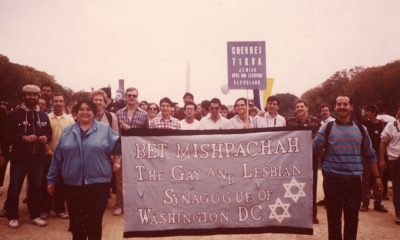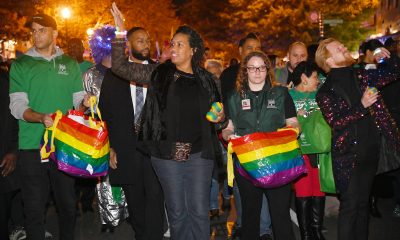a&e features
Newsom pardons LGBTQ and Black icon Rustin, stained by ‘historic homophobia’
‘Laws have been used as legal tools of oppression’
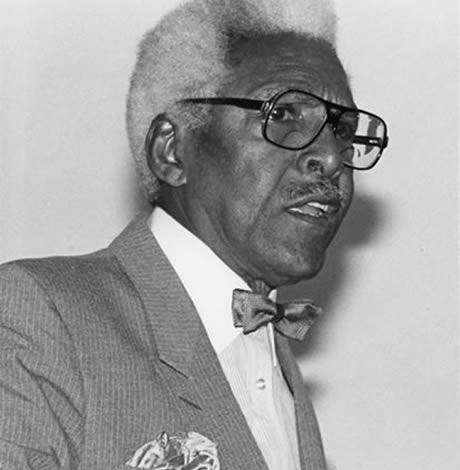
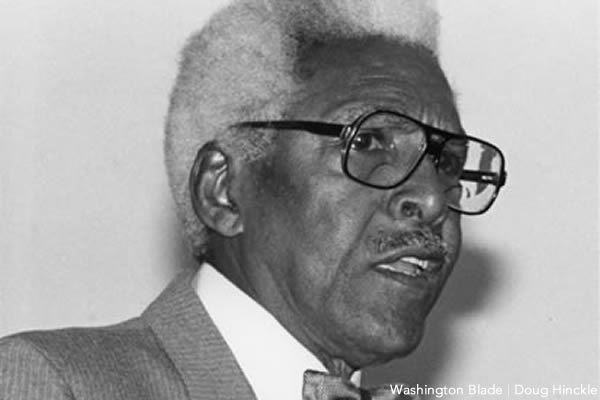
It was a patch of blue in the dark storm stalled over the divided states of America. On Feb. 5, California Gov. Gavin Newsom parted the pall and pardoned Bayard Rustin, mentor to Rev. Martin Luther King Jr. and chief organizer of the 1963 March on Washington. Though President Barack Obama posthumously awarded Rustin the Medal of Freedom in 2013, the gay civil rights icon still had the stain of a 1953 “morals charge” arrest in Pasadena on his lifetime of achievement.
“In California and across the country, many laws have been used as legal tools of oppression, and to stigmatize and punish LGBTQ people and communities and warn others what harm could await them for living authentically,” Newsom said in a statement. “I thank those who advocated for Bayard Rustin’s pardon, and I want to encourage others in similar situations to seek a pardon to right this egregious wrong.”
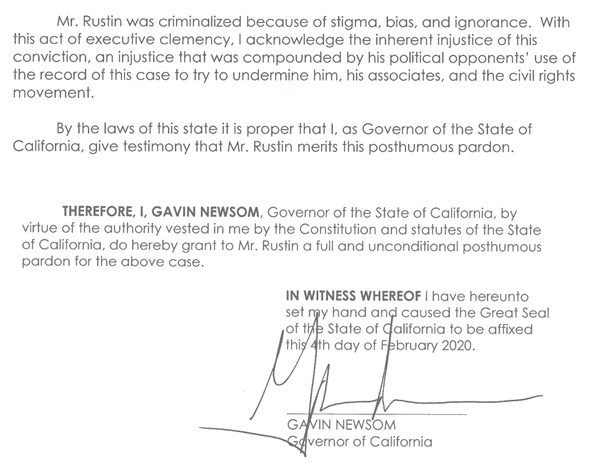
Excerpt of the pardon certificate
Rustin’s pardon launches a new clemency initiative for people who were prosecuted in California for being gay. In 1970, after the Stonewall riots and the movement for Gay Liberation, Assemblymember Willie Brown introduced the Consenting Adult Sex Bill to repeal the sodomy law and decriminalize gay sex. Five years later, with help from San Francisco Mayor George Moscone, the bill was finally passed and signed into law by Gov. Jerry Brown on May 12, 1975. But those convicted of engaging in consensual adult sexual conduct remained on the Sex Offender Registry until 1997, when a new law established a process enabling individuals to request removal. However, the original criminal conviction remained.
Newsom’s announcement acknowledges the systemic persecution of LGBTQ people and offers legal reparation.
“In California and across the country, charges like vagrancy, loitering, and sodomy have been used to unjustly target [LGBTQ] people. Law enforcement and prosecutors specifically targeted LGBTQ individuals, communities and community spaces for criminal prosecution. Now, as a proudly LGBTQ-allied state, California is turning the page on historic wrongs,” says the press release.
“There’s a cloud hanging over him because of this unfair, discriminatory conviction, a conviction that never should have happened, a conviction that happened only because he was a gay man,” state Sen. Scott Wiener, chair of California’s legislative LGBTQ caucus said Jan. 21 at a news conference with Assemblymember Shirley Weber, chair of the state’s Legislative Black Caucus, formally asking for a pardon.
“I’m thrilled that Governor Newsom is pardoning Bayard Rustin and that he acted so quickly and decisively in response to our request. I also applaud the Governor for broadening this work to provide other criminalized LGBT people with a path to clear their records of wrongful convictions on homophobic charges. These actions are consistent with the Governor’s deep and longstanding support for the LGBT community,” Wiener said in a statement. “Generations of LGBT people – including countless gay men – were branded criminals and sex offenders simply because they had consensual sex. This was often life-ruining, and many languished on the sex offender registry for decades. The Governor’s actions today are a huge step forward in our community’s ongoing quest for full acceptance and justice.”
“On behalf of the Black Caucus, I want to thank the Governor for granting this posthumous pardon. The Arc of Justice is long, but it took nearly 70 years for Bayard Rustin to have his legacy in the Civil Rights movement uncompromised by this incident. Rustin was a great American who was both gay and black at a time when the sheer fact of being either or both could land you in jail,” said Weber. “This pardon assures his place in history and the Governor’s ongoing commitment to addressing similar convictions shows that California is finally addressing a great injustice.”
“Civil rights champion Dr. Martin Luther King, Jr. said, ‘The time is always right to do what is right.’ For our friend Governor Newsom, that time is today. We are grateful to the governor for demonstrating our California values by pardoning civil rights hero, Bayard Rustin — a trusted aide to Dr. King — and for creating a system for other LGBTQ+ people to seek pardon from unjust convictions, said Equality California Executive Director Rick Zbur. “Today, Governor Newsom, and indeed the entire Golden State, did the right thing.”
That the pardon comes at the beginning of Black History Month is notable. On the 50th anniversary of the 1963 March on Washington, Professor Henry Louis Gates Jr. wrote on The Root: “I ask that if you teach your children one new name from the heroes of black history, please let it be Bayard Rustin.”
“For decades, this great leader, often at Dr. King’s side, was denied his rightful place in history because he was openly gay,” said President Obama, presenting Rustin’s medal to his longtime partner, Walter Naegle on Aug. 8, 2013. “No medal can change that, but today, we honor Bayard Rustin’s memory by taking our place in his march towards true equality, no matter who we are or who we love.”
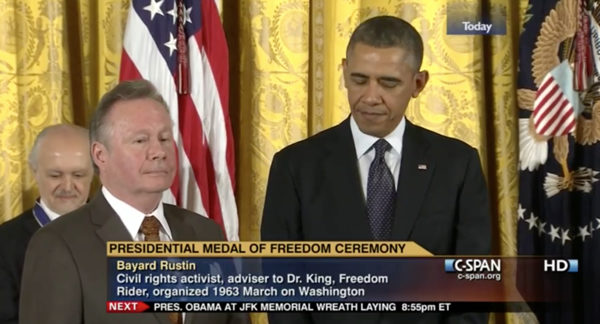
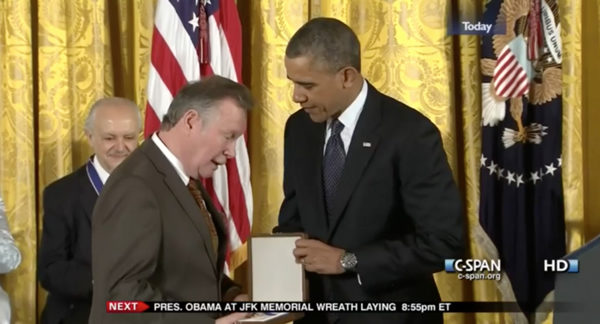
Born in 1912, Rustin learned about racism early on learned from his a Quaker grandmother in his West Chester, Pennsylvania hometown. She was also a member of the NAACP and intellectual civil rights leaders such as W.E.B. Du Bois and James Weldon Johnson were house guests.
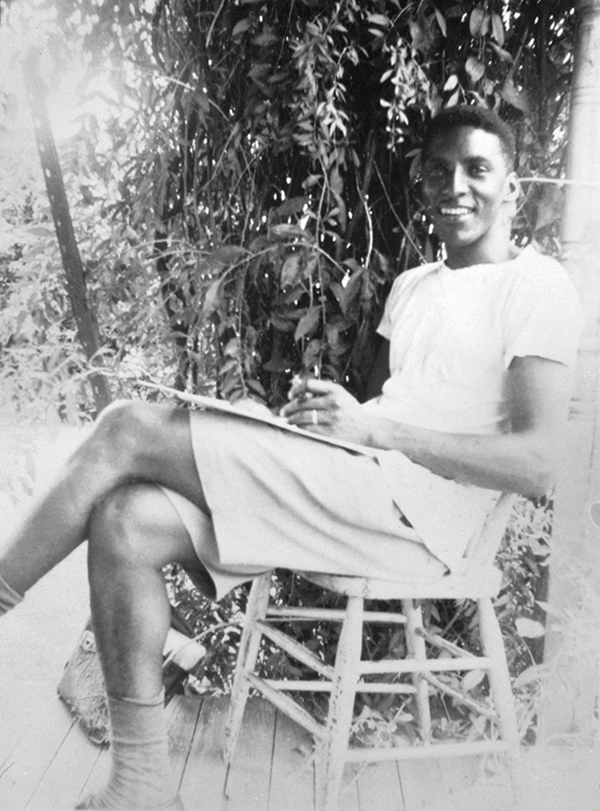
In high school, Rustin challenged the racially discriminatory Jim Crow laws by defying the rules to sit in the segregated balcony of a movie theater — for which he was arrested, as he recalled in the documentary Brother Outsider: The Life of Bayard Rustin.
“I once went into the little restaurant next to the Warner Theatre, and—can you believe it?—there was absolute consternation. That was the first occasion in which I knew West Chester had three police cars. They surrounded the place as if we were going to destroy motherhood. I purposely got arrested, and then I made an appeal that all the black people and white people who were decent-minded should give 10 cents to get me out of jail. And I got out, because they took up a collection.”
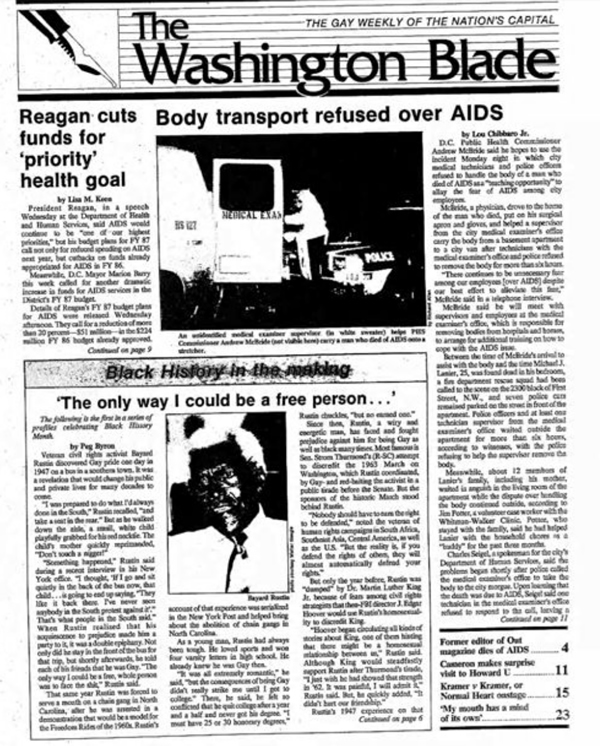
Rustin knew he was gay in high school, he told Washington Blade reporter Peg Byron on Feb. 5, 1986. But he remained closeted until 1947 after an encounter with a child on a bus trip in the South:
“One of the reasons that I decided that I should no longer remain in the closet came from an experience I had as a black. One day, in 19…, way back as far as 1947, I walked into a bus in the South, all prepared to do what I had always done in the South. Take a seat in the rear.
As I was going by the second seat to go to the rear, a white child reached out for the red necktie I was wearing and pulled it. Whereupon its mother said, “Don’t touch a nigger.”
Something happened, and I said to myself, If I go and sit quietly in the back of that bus now, that child who was so innocent of race relations that it was going to play with me, will have seen so many blacks go in the back and sit down quietly that it’s going to end up saying, “They like it back there, I’ve never seen anybody protest against it.” That’s what people in the South would say.
So I said, I owe it to that child, not only to my own dignity, but I owe it to that child that it should be educated to know that blacks do not want to sit in the back, and therefore I should get arrested letting all these white people in the bus know that I do not accept that.
Now, it occurred to me shortly after that that it was an absolute necessity for me to declare homosexuality, because if I didn’t I was a part of the prejudice. I was aiding and abetting…
Peggy Byron: Sitting in the back, yeah…
BR: … the prejudice that was a part of the effort to destroy me. And that in the long run the only way I could be a free whole person was to face the shit.
But from my own experience I know how long it can take till you free yourself. Thirty-four years is a long time to free yourself.”
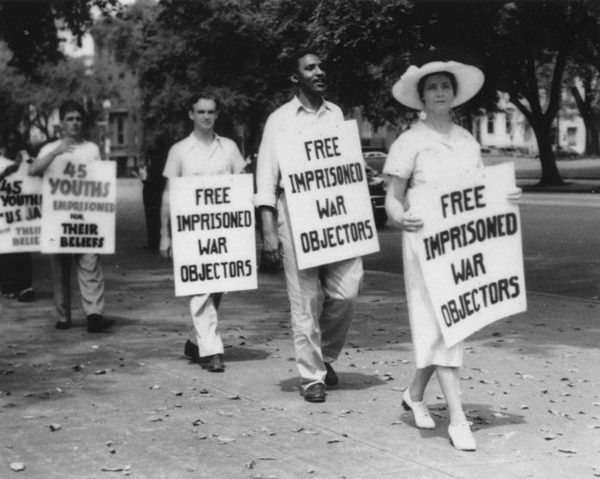
During those closeted years, he organized strikes in college, advocated to free the Scottsboro Boys, in 1936 joined the Young Communist League which fought segregation but left disillusioned when they dropped fighting Jim Crow to fight to get the US into World War II. Rustin then found two other pacifists – A. Philip Randolph, the head of the Brotherhood of Sleeping Car Porters and A. J. Muste, leader of the Fellowship of Reconciliation (FOR), who both became mentors.
By now Rustin was on FBI Director J. Edgar Hoover’s radar. Muste hired him to handle race relations. In 1941, the three pacifist socialists proposed a march on Washinton to protest segregation in the military and employment. After a meeting with President Roosevelt in the White House, FDR issued Executive Order 8802 (the Fair Employment Act) banning discrimination in defense industries and federal agencies. As an act of good faith in response, Randolph cancelled the march over Rustin’s objections. The military was finally desegregated in 1948 by President Truman, meaning black Americans fought racism and the Nazis and fascism, only to come home to Jim Crow.
Meanwhile, Rustin came to California to try to help Japanese Americans who were losing their property and their rights as the federal government imprisoned them in internment camps. He also foreshadowed the Freedom Rides by trying to desegregate interstate bus travel in 1942, for which he was arrested outside Nashville, beaten but never charged.
By 1948, the year after he came out, Rustin was well-known enough to be invited to India for an international pacifist conference.
“Mahatma Gandhi had been assassinated earlier that year, but his teachings touched Rustin in profound ways. ‘We need in every community a group of angelic troublemakers,’ he wrote after returning to the States. ‘The only weapon we have is our bodies, and we need to tuck them in places so wheels don’t turn,’” Prof. Gates writes.
The incident for which Rustin was pardoned happened in 1953. By now a respected organizer, Rustin traveled around the country giving speeches. After a speech one January night in Pasadena, police officers found him having sex with two white men in a parked car. Rustin was arrested, sentenced to jail for 60 days and was forced to register as a sex offender for the “morals charge.”
The arrest severely damaged his career in a country terrified by McCarthyism. He was forced to cancel speaking engagements and resigned from his leadership position with Muste’s Fellowship for Reconciliation.
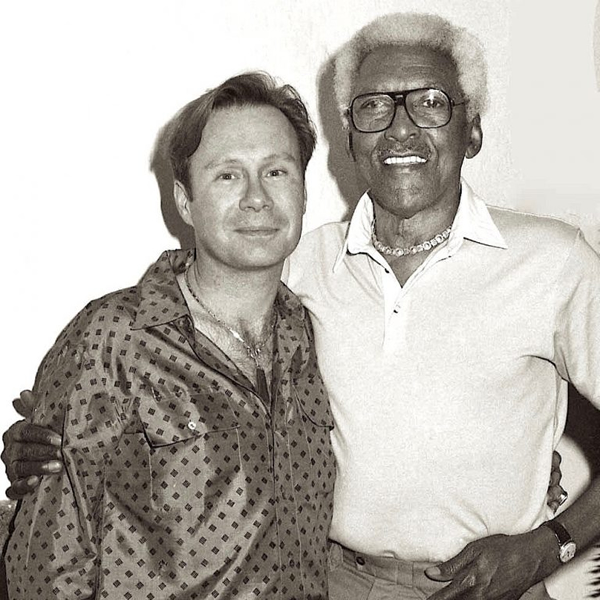
He struggled to find work, resorting to manual labor as a furniture mover, Naegle said later.
“I know now that for me sex must be sublimated if I am to live with myself and in this world longer,” he wrote in a March 1953 letter.
In 1955, Rustin secretly wrote “Speak Truth to Power: A Quaker Search for an Alternative to Violence.“In 1956, he found his way back into the civil rights movement, traveling to Alabama to advise Rev. Martin Luther King Jr. on how to organize his Montgomery Bus Boycott using Gandhi’s principles of non-violence. The two were introduced by Rustin’s friend Coretta Scott.
“King really had a very, very limited idea about nonviolence,” Julian Bond, who helped found the Student Nonviolent Coordinating Committee, told Democracy Now’s Amy Goodman. “It is Bayard Rustin who really tutored him, who said, ‘This is what you have to do.’ Rustin was horrified to see these pistols in King’s home, you know, and these armed guards around King’s home, because it just went against everything he believed in about nonviolence. If it hadn’t been for Bayard Rustin, Dr. King wouldn’t have had any understanding, I don’t think, of nonviolence. And Rustin tutored him and made him into the person we know he became.”
But that arrest record and the “open secret” of his homosexuality haunted him. Rustin was forced to resign from the Southern Christian Leadership Conference he co-founded after the powerful New York Rep. Adam Clayton Powell Jr. threatened to tell the press that he and King were lovers.
Gay historian, John D’Emilio author of “Lost Prophet: The Life and Times of Bayard Rustin,” told Amy Goodman:
“Bayard himself was very aware that given social attitudes towards homosexuality and gay men and lesbians, he couldn’t wear it on his sleeve. He couldn’t, you know, be out there with the rainbow flag. This was before gay liberation. So Bayard himself was perfectly happy to keep this in the background and to move out of the way, if that was going to be good for the movement.
What made him unhappy and what made him feel like he had been done wrong was when people disavowed him. And there was a point, in 1960, when Rustin and Mr. Randolph and Dr. King were part of organizing major demonstrations at the presidential conventions, Republicans and Democrats, and at that point Representative Adam Clayton Powell from Harlem didn’t like the fact that these radicals, someone like Bayard Rustin, was getting so much attention and moving into his sphere in the Democratic Party.
And he put out the word to Dr. King that if you don’t distance yourself from Bayard Rustin, I am going to claim that there is something going on between the two of you. And that scared Dr. King, and Bayard made the decision to resign from his position. But he also expected at that point that he would be defended. And when he wasn’t defended, it was—it was painful. It was very painful. And he spent a couple of years, mostly—in the early ’60s, mostly involved in the peace movement rather than in the civil rights movement because of that rupture. And it’s the March on Washington that brought him back into the center of things.”
“That was around 1962,” Rustin told the Washington Blade via the special Making Gay History podcast. “And, naturally, I took the position that if people feel that I am a danger to some important movement, I would leave. But the thing which distressed me was that if… if Martin had taken the strong stand then that he took a year later, in ’63, vis-à-vis Strom Thurmond, he could have overcome it and kept me. But I understand his doing it, and I hold no grief with him about having done it. I just wish that he had shown the strength in ’62 that he showed when he backed me completely in ’63. But he was a year older and had another year’s experience.”
A. Philip Randolph brought Rustin back into the fold to organize the 1963 March on Washington for Jobs and Freedom but NAACP’s Roy Wilkins saw Rustin as a liability and forced him to take a deputy position.
But then FBI Director J. Edger Hoover slipped Rustin’s arrest record to rabidly anti-gay South Carolina Sen. Strom Thurmond – who had secretly fathered a child with his African-America maid. Three weeks before the march, Thurmond went public, trying to destroy the unprecedented event by denouncing Rustin as a gay communist and placing his arrest record in the congressional record.
Rustin told the Washington Blade:
“Now this became very clear to me in 1963, when I was organizing the March on Washington. And Strom Thurmond stood up in the Senate of the United States and for three-quarters of an hour, attacked me as a draft dodger, which was untrue, because I was a conscientious objector and well known as being a Quaker opposed to all violence. He attacked me as a former member of the Young Communist League, which was true. I had been. He attacked me as a homosexual. Which of course I was.
PB: You were the original commie-pinko-fag of the day, I suppose.”
BR: Yeah, exactly. Now, there were 10 leaders of that march. One of the most important Jews, the most important Catholic, the most important Protestant, Walter Reuther representing the trade union movement, and six black civil rights leaders.
When he attacked me, I had absolutely no basic apprehension and for a very good reason, because I had spent a great deal of my life defending prejudice against Catholics, against trade unions, against Jews, against blacks, against Protestants, and therefore I inwardly knew that those leaders, knowing of my history, had to come to my defense. And they did. And the important thing was that they voted that only one person should speak, and that was the founder of the march, Mr. A. Philip Randolph.”
For what spans five pages in the Congressional Record, Thurmond not only submitted the arrest record but the news articles about the arrest and conviction.
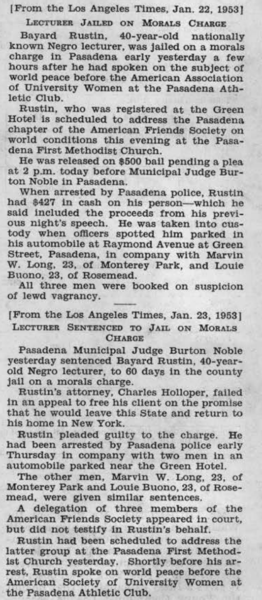
“The article states that he was convicted in 1953 in Pasadena, California, of a morals charge. The words ‘morals charge’ are true. But this is a clear-cut case of toning down the charge. The conviction was sex perversion,” says Thurmond.
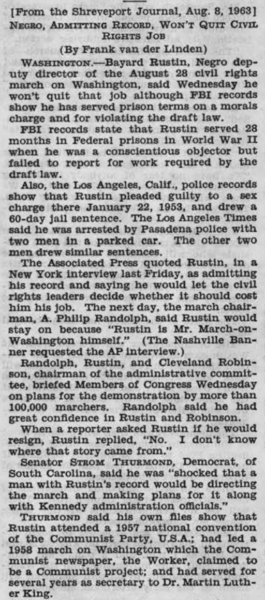
“The senator is not interested in me if I were a murderer, a thief, a liar or a pervert. The senator is interested in attacking me because he is interested in destroying the movement. He will not get away with this,” Rustin said.
King and the other Big Six backed Rustin up this time because the attacks came from one of the worst Southern white supremacists. But after the march, Rustin was quietly denied his role as the seventh in the Bix Six group of civil rights leaders who called for the march: A. Philip Randolph, Roy Wilkins, Rev. Dr. Martin Luther King Jr., John Lewis, Jim Farmer, Whitney Young when the chief organizer of the march was disinvited to the White House to celebrate with President John F. Kennedy.
And yet, according to an extensive CNN report commemorating the 50th anniversary of the march, it was Rustin who saved the march for the organizers – from a Kennedy take over.
“The Kennedys were almost morbidly afraid of this march. They understood there’d been nothing like it,” Rep. Eleanor Holmes Norton, D-District of Columbia, who helped plan the march, told CNN.
“The Kennedy administration was afraid that if there was violence on the march, it would mean that the Civil Rights Act, which John F. Kennedy had just introduced, would never get passed,” said march planner Rachelle Horowitz. “When we first began planning the march, there was a concerted effort by the Kennedy administration to get it called off and to not let it take place.”
“They kept a watchful eye on the planning of the march,” said John Lewis, the 23-year-old elected to lead the Student Nonviolent Coordinating Committee. “They stayed in touch with the (march) leadership,” which had been broadened to include four white leaders, representatives of the Protestant, Jewish and Catholic faiths, and civil rights advocate and United Auto Workers president Walter Reuther.
Reuther was recruited by the White House “to infiltrate the march and steer it away from radical rhetoric and direct action,” wrote Charles Euchner in his book “Nobody Turn Me Around,” about the historic march. “And so he did.”
Though JFK had come around to the idea of the march, Attorney General Robert F. Kennedy’s office inside the Justice Department’s room 5110 “was the command center,” Jack Rosenthal, who was the department’s assistant press officer at the time, told CNN.
“There was a proposal on the table that Kennedy speak to the March on Washington,” march planner Courtland Cox told CNN. “And Bayard knew this would have been a disaster because it would’ve been taken over by (Kennedy) just because he’s president. It would’ve been Kennedy’s march.”
From CNN:
“So, Cox said Rustin and he excused themselves from that particular meeting and took a walk to the bathroom. Clearly flummoxed about the problem, Rustin took a sip from his back-pocket flask and came up with an idea on the fly.
“And Bayard got back into the meeting and he literally made this up,” Cox recalled. “He said that he heard … if the president spoke the Negroes were going to stone him.”
After that, the idea of Kennedy speaking at the march was never considered.”
None of the feared outbreaks of violence occurred.
“After the March on Washington was over, President Kennedy had invited us back down to the White House,” Lewis said. “He stood in the door of the Oval Office and he greeted each one of us. He was like a beaming, proud father. He was so pleased. So happy that everything had gone so well.”
Kennedy told King: “And you had a dream,” added Lewis.
Rustin’s role was overshadowed – as were his remarks at the march that August 28, 1963:
“We demand that segregation be ended in every school district in the year 1963! We demand that we have effective civil rights legislation—no compromise, no filibuster—and that include public accommodations, decent housing, integrated education, FEPC and the right to vote. What do you say? We demand the withholding of federal funds from all programs in which discrimination exists. What do you say?”
Rustin died of a perforated appendix on August 24, 1987, survived by Walter Naegle, his partner of 10 years.
One last thing, Julian Bond told Amy Goodman:
“I could not think of anybody else who at the time would have stepped forward, taken hold of this March on Washington, pull together all these hundreds of thousands of peoples, the buses, the trains. You know, I saw something just recently: They made 800,000 sandwiches. Imagine that. And it was all done at Bayard Rustin’s desire.
One thing I think we’re not hearing about Bayard Rustin is his sense of humor. He once said that Dr. King couldn’t bring vampires to a bloodbath. That was the kind of organizer Dr. King was not. But Bayard Rustin knew he was an organizer and was just wonderful at getting people to do things that they didn’t think they could do or didn’t know they wanted to do. He was just a great, great person….
I think those of us who were there in 1963 didn’t immediately realize how significant this was. As you said during the program, we didn’t see many people there early in the morning. The crowd grew and grew and grew. But even when they were all there, you had no idea how many there were. You know, you can’t look out at this mass of people and say, “This is 250,000 people.” You just have no idea who they are. And I think, for me, driving back to Atlanta later that day and then reading newspapers the next day in Atlanta and hearing what other people had to say about it, only then would we began to understand the significance of this thing—the largest gathering ever at a civil rights protest.
People came together to demand civil rights in America, and that was tremendously significant. But, as you say, if you compare these demands that Bayard read at the march with where we are today, you can see that clearly most of these things have not been achieved, and we still have a long, long way to go.”
While Rustin didn’t attend the White House meeting, he and A. Philip Randolph did make the cover of LIFE magazine.
“Rustin was one of the most important social justice activists in the U.S. in the 20th century,” says historian John D’Emilio.
That 1953 arrest record hung like an invisible chain around Rustin’s neck. Now he is really, finally free.
If you think you are eligible and would like to seek clemency, you can apply for a pardon and receive updates and information on the clemency initiative at www.gov.ca.gov/clemency
a&e features
Tristan Schukraft on keeping queer spaces thriving
New owner of LA’s Abbey expands holdings to Fire Island, Mexico

LOS ANGELES — Like the chatter about Willy Wonka and his Chocolate Factory, the West Hollywood community here started to whisper about the man who was going to be taking over the world-famous Abbey, a landmark in Los Angeles’s queer nightlife scene. Rumors were put to rest when it was announced that entrepreneur Tristan Schukraft would be taking over the legacy created by Abbey founder David Cooley. All eyes are on him.
For those of us who were there for the re-opening of The Abbey, when the torch was officially passed, all qualms about the new regime went away as it was clear the club was in good hands and that the spirit behind the Abbey would forge on. Cher, Ricky Martin, Bianca del Rio, Jean Smart, and many other celebrities rubbed shoulders with veteran patrons, and the evening was magical and a throwback to the nightclub atmosphere pre-COVID.
The much-talked-about purchase of the Abbey was just the beginning for Schukraft. It was also announced that this business impresario was set to purchase the commercial district of Fire Island, as well as projects launching in Mexico and Puerto Rico. What was he up to? Tristan sat down with the Blade to chat about it all.
“We’re at a time right now when the last generation of LGBT entrepreneurs and founders are all in their 60s and they’re retiring. And if somebody doesn’t come in and buy these places, we’re going to lose our queer spaces.”
Tristan wasn’t looking for more projects, but he recounts what happened in Puerto Rico. The Atlantic Beach Hotel was the gay destination spot and the place to party on Sundays, facing the gay beach. A new owner came in and made it a straight hotel, effectively taking away a place of fellowship and history for the queer community. Thankfully, the property is gay again, now branded as the Tryst and part of Schukraft’s portfolio with locations in Puerto Vallarta and Fire Island.
“If that happens with the Abbey and West Hollywood, it’s like Bloomingdale’s in a mall. It’s kind of like a domino effect. So that’s really what it is all about for me at this point. It has become a passion project, and I think now more than ever, it’s really important.”
Tristan is fortifying spaces for the queer community at a time when the current administration is trying to silence the LGBTQ+ community. The timing is not lost on him.
“I thought my mission was important before, and in the last couple of months, it’s become even more important. I don’t know why there’s this effort to erase us from public life, but we’ve always been here. We’re going to continue to be here, and it brings even more energy and motivation for me to make sure the spaces that I have now and even additional venues are protected going in the future.”
The gay community is not always welcoming to fresh faces and new ideas. Schukraft’s takeover of the Abbey and Fire Island has not come without criticism. Who is this man, and how dare he create a monopoly? As Schukraft knows, there will always be mean girls ready to talk. In his eyes, if someone can come in and preserve and advance spaces for the queer community, why would we oppose that?
“I think the community should be really appreciative. We, as a community, now, more than ever, should stand together in solidarity and not pick each other apart.”
As far as the Abbey is concerned, Schukraft is excited about the changes to come. Being a perfectionist, he wants everything to be aligned, clean, and streamlined. There will be changes made to the DJ and dance booth, making way for a long list of celebrity pop-ups and performances. But his promise to the community is that it will continue to be the place to be, a place for the community to come together, for at least another 33 years.
“We’re going to build on the Abbey’s rich heritage as not only a place to go at night and party but a place to go in the afternoon and have lunch. That’s what David Cooley did that no others did before, is he brought the gay bar outside, and I love that.”
Even with talk of a possible decline in West Hollywood’s nightlife, Schukraft maintains that though the industry may have its challenges, especially since COVID, the Abbey and nightlife will continue to thrive and grow.
“I’m really encouraged by all the new ownership in [nightlife] because we need another generation to continue on. I’d be more concerned if everybody was still in their sixties and not letting go.”
In his opinion, apps like Grindr have not killed nightlife.
“Sometimes you like to order out, and sometimes you like to go out, and sometimes you like to order in, right? There’s nothing that really replaces that real human interaction, and more importantly, as we know, a lot of times our family is our friends, they’re our adopted family.
Sometimes you meet them online, but you really meet them going out to bars and meeting like-minded people. At the Abbey, every now and then, there’s that person who’s kind of building up that courage to go inside and has no wingman, doesn’t have any gay friends. So it’s really important that these spaces are fun, to eat, drink, and party. But they’re really important for the next generation to find their true identity and their new family.”
There has also been criticism that West Hollywood has become elitist and not accessible to everyone in the community. Schukraft believes otherwise. West Hollywood is a varied part of queer nightlife as a whole.
“West Hollywood used to be the only gay neighborhood, and now you’ve got Silver Lake and you’ve got parts of Downtown, which is really good because L.A., is a huge place. It’s nice to have different neighborhoods, and each offers its own flavor and personality.”
Staunch in his belief in his many projects, he is not afraid to talk about hot topics in the community, especially as they pertain to the Abbey. As anyone who goes to the Abbey on a busy night can attest to, the crowd is very diverse and inclusive. Some in the community have started to complain that gay bars are no longer for the gay community, but are succumbing to our straight visitors.
Schukraft explains: “We’re a victim of our own success. I think it’s great that we don’t need to hide in the dark shadows or in a hole-in-the-wall gay bar. I’m happy about the acceptance. I started Tryst Hotels, which is the first gay hotel. We’re not hetero-friendly, we’re not gay-friendly. We’re a gay hotel and everyone is welcome. I think as long as we don’t change our behavior or the environment in general at the Abbey, and if you want to party with us, the more than merrier.”
Schukraft’s message to the community?
“These are kind of dangerous times, right? The rights that we fought for are being taken away and are being challenged. We’re trying to be erased from public life. There could be mean girls, but we, as a community, need to stick together and unite, and make sure those protections and our identity aren’t erased. And even though you’re having a drink at a gay bar, and it seems insignificant, you’re supporting gay businesses and places for the next generation.”
a&e features
Creator Max Mutchnick on inspirations for ‘Mid-Century Modern’
Real-life friendships and loss inform plot of new Hulu show

It’s been a long time – maybe 25 years when “Will & Grace” debuted – since there’s been so much excitement about a new, queer sitcom premiering. “Mid-Century Modern,” which debuted on Hulu last week, is the creation of Max Mutchnick and David Kohan, the gay men who were also behind “Will & Grace.”
Set in Palm Springs, Calif., following the death of the one of their closest friends, three gay men gather to mourn. Swept up in the emotions of the moment, Bunny (Nathan Lane) suggests that Atlanta-based flight attendant Jerry (Matt Bomer) and New York-based fashion editor Arthur (Nathan Lee Graham) move into the mid-century modern home he shares with his mother Sybil (the late Linda Lavin). Over the course of the first season’s 10 episodes, hilarity ensues. That is, except for the episode in which they address Sybil’s passing. The three male leads are all fabulous, and the ensemble cast, including Pamela Adlon as Bunny’s sister Mindy, and the stellar line-up of guest stars, such as Jesse Tyler Ferguson, Vanessa Bayer, Richard Kind, and Cheri Oteri, keep humor buzzing. Shortly before the premiere of “Mid-Century Modern,” Mutchnick made time for an interview with the Blade.
BLADE: I’d like to begin by saying it’s always a delight to speak to a fellow Emerson College alum. In ways would you say that Emerson impacted your professional and creative life?
MAX MUTCHNICK: I think Emerson was the first place that reflected back to me that my voice, my thoughts were good, and they were worth listening to. I developed a confidence at Emerson that did not exist in my body and soul. It was a collection of a lot of things that took place in Boston, but I mean we can just put it all under the Emerson umbrella.
BLADE: Before “Will & Grace,” you co-created the NBC sitcom “Boston Common,” which starred fellow Emerson alum Anthony Clark. Is it important for you to maintain those kinds of alumni relationships?
MUTCHNICK: Because Emersonians are such scrappy little monkeys and they end up being everywhere in the world, you can’t help but work with someone from Emerson at some point in your career. I’m certainly more inclined to engage with someone from Emerson once I learn that they went to my alma mater. For me, it has much more to do with history and loyalty. I don’t think of myself as one of those guys that says, “Loyalty means a lot to me. I’m someone that really leans into history.” It’s just what my life and career turned out to be. The longer I worked with people and the more often I worked with them, the safer that I felt, which means that I was more creative and that’s the name of the game. I’ve got to be as comfortable as possible so I can be as creative as possible. If that means that a person from Emerson is in the room, so be it. (Costume designer) Lori Eskowitz would be the Emerson version. And then (writer and actor) Dan Bucatinsky would be another version. When I’m around them for a long time, that’s when the best stuff comes.
BLADE: Relationships are important. On that subject, your new Hulu sitcom “Mid-Century Modern” is about the longstanding friendship among three friends, Bunny (Nathan Lane), Jerry (Matt Bomer), and Arthur (Nathan Lee Graham). Do you have a friendship like the one shared by these three men?
MUTCHNICK: I’m absolutely engaged in a real version of what we’re projecting on the show. I have that in my life. I cannot say that I’m Jerry in any way, but the one thing that we do have in common is that in my group, I’m the young one. But I think that that’s very common in these families that we create. There’s usually a young one. Our culture is built on learning from our elders. I didn’t have a father growing up, so maybe that made me that much more inclined to seek out older, wiser, funnier, meaner friends. I mean the reason why you’re looking at a mouthful of straight, white teeth is because one of those old bitches sat across from me about 25 years ago at a diner and said, “Girl, your teeth are a disaster, and you need to get that fixed immediately.” What did I know? I was just a kid from Chicago with two nickels in my pocket. But I found three nickels and I went and had new teeth put in my head. But that came from one of my dearest in the group.
BLADE: Do you think that calling “Mid-Century Modern” a gay “Golden Girls” is a fair description?
MUTCHNICK: No. I think the gay “Golden Girls” was really just used as a tool to pitch the show quickly. We have an expression in town, which is “give me the elevator pitch,” because nobody has an attention span. The fastest way you can tell someone what David (Kohan) and I wanted to write, was to say, “It’s gay Golden Girls.” When you say that to somebody, then they say, “OK, sit down now, tell me more.” We did that and then we started to dive into the show and realized pretty quickly that it’s not the gay “Golden Girls.” No disrespect to the “Golden Girls.” It’s a masterpiece.
BLADE: “Mid-Century Modern” is set in Palm Springs. I’m based in Fort Lauderdale, a few blocks south of Wilton Manors, and I was wondering if that gay enclave was ever in consideration for the setting, or was it always going to be in Palm Springs?
MUTCHNICK: You just asked a really incredible question! Because, during COVID, Matt Bomer and I used to walk, because we live close by. We had a little walking group of a few gay gentlemen. On one of those walks, Matt proposed a comedy set in Wilton Manors. He said it would be great to title the show “Wilton Manors.” I will tell you that in the building blocks of what got us to “Mid-Century Modern,” Wilton Manors, and that suggestion from Matt Bomer on our COVID walks, was part of it.
BLADE: Is Sybil, played by the late Linda Lavin, modeled after a mother you know?
MUTCHNICK: Rhea Kohan (mother of David and Jenji). When we met with Linda for the first time over Zoom, when she was abroad, David and I explained to her that this was all based on Rhea Kohan. In fact, some of the lines that she (Sybil) speaks in the pilot are the words that Jenji Kohan spoke about her mother in her eulogy at the funeral because it really summed up what the character was all about. Yes, it’s very much based on someone.
BLADE: The Donny Osmond jokes in the second episode of “Mid-Century Modern” reminded me of the Barry Manilow “fanilows” on “Will & Grace.” Do you know if Donny is aware that he’s featured in the show?
MUTCHNICK: I don’t. To tell you the truth, the “fanilow” episode was written when I was not on the show. I was on a forced hiatus, thanks to Jeff Zucker. That was a show that I was not part of. We don’t really work that way. The Donny Osmond thing came more from Matt’s character being a Mormon, and also one of the writers. It’s very important to mention that the writing room at “Mid-Century Modern,” is (made up of) wonderful and diverse and colorful incredible humans – one of them is an old, white, Irish guy named Don Roos who’s brilliant…
BLADE: …he’s Dan Bucatinsky’s husband.
MUTCHNICK: Right! Dan is also part of the writing room. But I believe it was Don who had a thing for Donny, and that’s where it comes from. I don’t know if Donny has any awareness. The only thing I care about when we turn in an episode like that is I just want to hear from legal that we’re approved.
BLADE: “Mid-Century Modern” also includes opportunities for the singers in the cast. Linda Lavin sang the Jerome Kern/Ira Gershwin tune “Long Ago (And Far Away)” and Nathan Lane and the guys sang “He Had It Coming” from “Chicago.” Was it important to give them the chance to exercise those muscles?
MUTCHNICK: I don’t think it was. I think it really is just the managers’ choice. David Kohan and I like that kind of stuff, so we write that kind of stuff. But by no means was there an edict to write that. We know what our cast is capable of, and we will absolutely exploit that if we’re lucky enough to have a second season. I have a funky relationship with the song “Long Ago (And Far Away).” It doesn’t float my boat, but everybody else loved it. We run a meritocracy, and the best idea will out. That’s how that song ended up being in the show. I far prefer the recording of Linda singing “I’ll Be Seeing You” over her montage in episode eight, “Here’s To You, Mrs. Schneiderman.” We were just lucky that Linda had recorded that. That recording was something that she had done and sent to somebody during COVID because she was held up in her apartment. That’s what motivated her to make that video and send it. That’s how we were able to use that audio.
BLADE: Being on a streaming service like Hulu allows for characters to say things they might not get away with on network TV, including a foreskin joke, as well as Sybil’s propensity for cursing.
MUTCHNICK: And the third line in the show is about him looking like a “reluctant bottom.” I don’t think that’s something you’re going to see on ABC anytime soon. David and I liked the opportunity to open up the language of this show because it might possibly open the door to bringing people…I’m going to mix metaphors…into the tent that have never been there before. A generation that writes off a sitcom because that language and that type of comedy isn’t the way that they sound. One of the gifts of doing this show on Hulu is that we get to write dialogue that sounds a little bit more like you and I sound. As always, we don’t want to do anything just to do it.
BLADE: It didn’t feel that way.
MUTCHNICK: It’s there when it’s right. [Laughs] I want to have a shirt made with Linda’s line, as her mother always used to say, “Time is a cunt.”
BLADE: “Mid-Century Modern” also utilizes a lot of Jewish humor. How important is it for you to include that at this time when there is a measurable rise in anti-Semitism?
MUTCHNICK: I think it’s important, but I don’t think it’s the reason why we did it. We tried very hard to not write from a place of teaching or preaching. We really are just writing about the stuff that makes us laugh. One of the things that makes something better and something that you can invest in is if it’s more specific. We’re creating a character whose name is Bunny Schneiderman and his mother’s name is Sybil and they made their money in a family-run business, it gets Jewy, and we’re not going to shy away from it. But we’re definitely not going to address what’s going on in the world. That doesn’t mean I don’t find it very upsetting, but I’m writing always from the point of view of entertaining the largest number of people that I can every week.
BLADE: “Mid-Century Modern” has a fantastic roster of guest stars including Jesse Tyler Ferguson, Vanessa Bayer, Billie Lourd, Cheri Oteri, Richard Kind, Rhea Perlman, and Judd Hirsch. Are there plans to continue that in future seasons?
MUTCHNICK: Yes. As I keep saying, if we’re so lucky that we get to continue, I don’t want to do “The Love Boat.” Those are fine comic actors, so I don’t think it feels like that. But if we get to keep going, what I want to do is broaden the world because that gives us more to write about. I want to start to introduce characters that are auxiliary to the individuals. I want to start to meet Arthur’s family, so we can return to people. I want to introduce other neighbors, and different types of gay men because we come in so many different flavors. I think that we should do that only because I’m sure it’s what your life is and it’s what my life is. I’ve got a lot of different types. So, yes, we will be doing more.
BLADE: Finally, Linda Lavin passed away in December 2024, and in a later episode, the subject of her character Sybil’s passing is handled sensitively, including the humorous parts.
MUTCHNICK: We knew we had a tall order. We suffered an incredible loss in the middle of making this comedy. One of the reasons why I think this show works is because we are surrounded by a lot of really talented people. Jim Burrows and Ryan Murphy, to name two. Ryan played a very big role in telling us that it was important that we address this, that we address it immediately. That we show the world and the show goes on. That wasn’t my instinct because I was so inside the grief of losing a friend, because she really was. It wasn’t like one of those showbizzy-type relationships. And this is who she was, by the way, to everybody at the show. It was the way that we decided to go. Let’s write this now. Let’s not put this at the end of the season. Let’s not satellite her in. Let’s not “Darren Stevens” the character, which is something we would never do. The other thing that Jim Burrows made very clear to us was the import of the comedy. You have to write something that starts exactly in the place that these shows start. A set comedy piece that takes place in the kitchen. Because for David and me, as writers, we said we just want to tell the truth. That’s what we want to do with this episode and that’s the way that this will probably go best for us. The way that we’ve dealt with grief in our lives is with humor. That is the way that we framed writing this episode. We wanted it to be a chapter from our lives, and how we experience this loss and how we recover and move on.
a&e features
Margaret Cho returns to music with ‘Lucky Gift’
Collection of pop tunes includes tribute to non-binary people
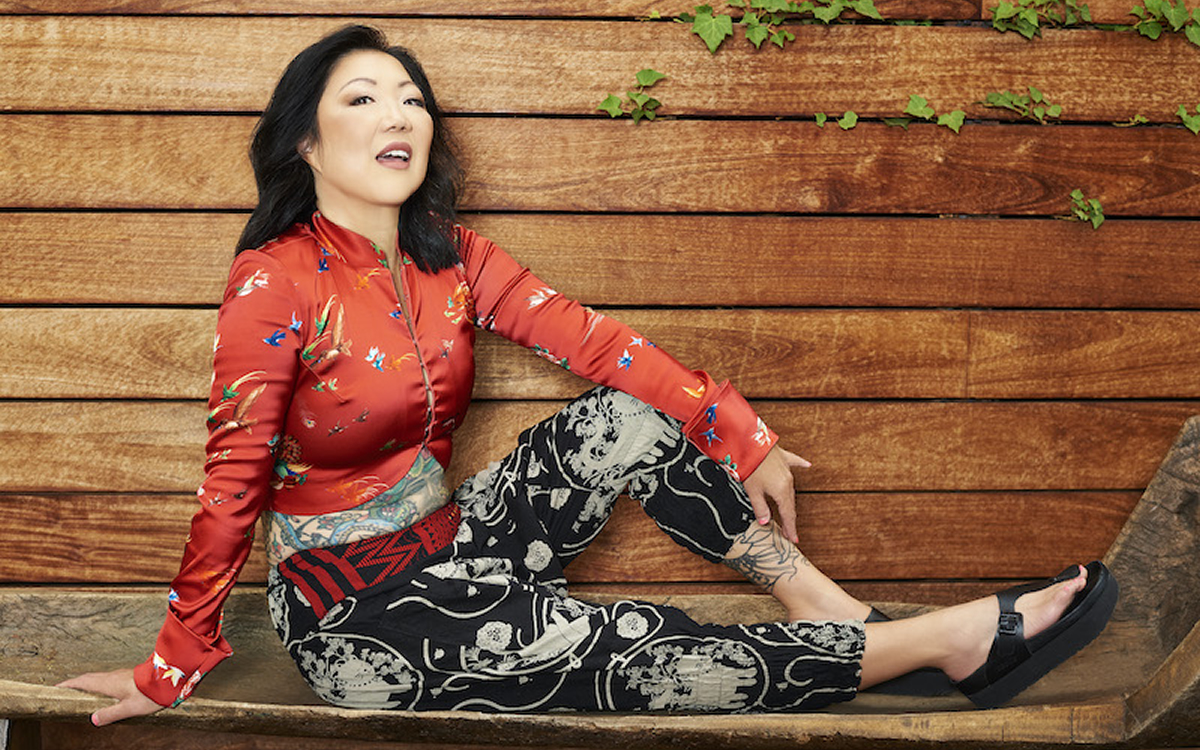
LOS ANGELES — It has been eight years since Margaret Cho released her Grammy-nominated “American Myth” album. She’s back to the music scene with her new album, “Lucky Gift,” an 11-track collection of anthems and pop tunes, a tribute to Robin Williams, and a shout-out to non-binary and gender non-conforming people.
The album captures the whirlwind that is Margaret and all of the different facets of her talents that have made her a powerhouse in entertainment and a leader in activism. In “Lucky Gift,” she’s getting her point across while having fun and getting glam.
We caught up with the activist and artist to chat about her music, our political climate, and the power of pop divas.
Known for her comedy, acting, and activism, she felt it was long overdue to get her music back out there too.
“I make music often. It’s a part of my daily life, it’s a big part of my social life, and it’s just something that I just love to do for my own relaxation and fun. I had enough for an album and I wanted to finally put them out. I was just really proud of how it all sounded together,” shares Cho.
“It’s a power pop record. For me, the songs are really meaningful. They’re all in their own way love songs. I’m a big fan of my own music (laughs), I really like the way that I sound and it’s really special to do. People know me as a comedian, and I have also made music for a long time, but it’s sort of a side project, and so it was time to put more out again.”
Her album also includes a touching tribute to Robin Williams. The entertainment community is finally more comfortable talking about mental health more openly. When relating mental health to her own life, Margaret, in true Margaret form, quickly turned the conversation to reflect today’s political climate.
“I have to maintain a level of peace and quiet and sometimes maybe get away from the news, although that’s tough because I am obsessed. I want to know what is happening. I’m really worried for our community, especially the trans community. I’m worried that this administration is trying to separate T and the Q from the LGBTQIA, and it’s really frightening.”
As an elder, Cho says she has to also remember that we’ve been through this before and it’s actually been much worse. As a community, we’ve been through a similar situation, and we were facing down a pandemic, which was killing us by the millions. So at least now we don’t have to fight AIDS as well as this onslaught of homophobia.
“We have fought for our rights, and we still have them, but we may not have them for long. So our mental health is very important to preserve now because we have to fight. The one thing to remember is they can’t do everything at once. They can’t take away trans rights, queer rights, gay rights, gay marriage, anti-depressants —ha — at the same time. So what we can do is just try to remain as calm as possible and fight as strongly as we can. But yeah, mental health is really vitally important right now.”
Margaret’s long history of queer activism stands for itself. She does not shy away from current issues, she uses her platforms to incite, educate, and question. For Margaret, there is no time off from being an activist. She was born into it, so to speak, being raised in San Francisco in the 1970s, her parents — the owners of a gay bookstore — and their employees followers of Harvey Milk.
“My activism is that I don’t have a choice. I’m going to be an activist no matter what. We’re doing this together, we’re going through this together. I will always be political. It’s just disheartening to see the ignorance of people and the lies that are being told that are believed.”
Margaret’s “Lucky Gift” comes at a perfect time when the queer community can come together over music. Cho looks at her album as a tool to empower an underdog community through the power of music.
“It’s the triumph of pop above all. We need to look to our pop divas above all. So now I’m more than ever, leaning on Madonna. [Thank God for Lady Gaga’s] “Abracadabra” because I think that things like that boost our community so much. When you can just get together and have a “brat summer,” that boosts our community so much in this togetherness, this explosion of excitement. I think Chappell Roan really ignited the pop capacity for healing. I love ‘Lucky Gift’ because it is my stepping into a pop diva moment. Pop divas should not be discounted for how important they are to our society and how much they lift us up.”
In addition to releasing her new album, Cho will continue to hit the road this year with her “Live and LIVID! Tour,” celebrating more than four decades of live stand-up shows. On this tour, she promises to rage about homophobia, sexism, racism, and the fight to stay alive. The five-time Grammy and Emmy-nominated performer is not holding back. According to her, the nation is not divided, just a little lost.
“We’re not divided. Everybody hates this. We all hate this. The fact is, the majority of the country does not want this. Unfortunately, a lot of people just didn’t vote because they just didn’t want to participate. That’s why we’re in the situation that we’re in. So to be on the road is a pleasure. And I rarely come against opposition. Every once in a while there’s something, but it’s something that we all handle. I think we all need a voice, a strong voice of reason to combat all of the hysteria.”
And her message to her fans?
“We’ll get through this. We’ll get through this with pop divas. ‘Abracadabra,’ learn the choreography, you do it sitting down. At least we have pop music, I have my hat in the ring here. But at least we have each other and we’re going to be OK. It’s going to be a ride, it’s going to be intense, but we can do this. We’ve been through this before and we are going to be fine.”
“Lucky Gift”is now available on all major streaming platforms.
-

 District of Columbia2 days ago
District of Columbia2 days agoReenactment of 1965 gay rights protest at White House set for April 17
-

 Hungary2 days ago
Hungary2 days agoHungarian MPs amend constitution to ban public LGBTQ events
-

 Maryland2 days ago
Maryland2 days agoFreeState Justice: Transgender activist ‘hijacked’ Moore’s Transgender Day of Visibility event
-

 Real Estate3 days ago
Real Estate3 days agoNavigating DMV real estate market during political unrest



